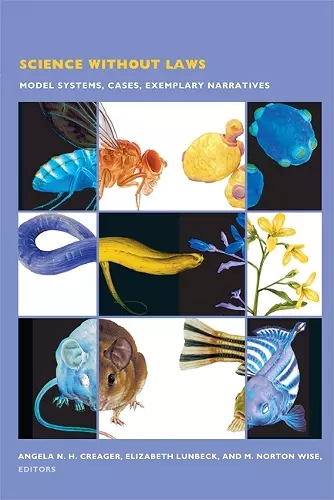Science without Laws
Model Systems, Cases, Exemplary Narratives
Angela N H Creager editor Elizabeth Lunbeck editor M Norton Wise editor
Format:Paperback
Publisher:Duke University Press
Published:3rd Sep '07
Currently unavailable, and unfortunately no date known when it will be back

Essays on case-based reasoning in the natural- and human sciences.
A comparison of the use of model systems and exemplary cases across fields in the natural and social sciences.Physicists regularly invoke universal laws, such as those of motion and electromagnetism, to explain events. Biological and medical scientists have no such laws. How then do they acquire a reliable body of knowledge about biological organisms and human disease? One way is by repeatedly returning to, manipulating, observing, interpreting, and reinterpreting certain subjects—such as flies, mice, worms, or microbes—or, as they are known in biology, “model systems.” Across the natural and social sciences, other disciplinary fields have developed canonical examples that have played a role comparable to that of biology’s model systems, serving not only as points of reference and illustrations of general principles or values but also as sites of continued investigation and reinterpretation. The essays in this collection assess the scope and function of model objects in domains as diverse as biology, geology, and history, attending to differences between fields as well as to epistemological commonalities.
Contributors examine the role of the fruit fly Drosophila and nematode worms in biology, troops of baboons in primatology, box and digital simulations of the movement of the earth’s crust in geology, and meteorological models in climatology. They analyze the intensive study of the prisoner’s dilemma in game theory, ritual in anthropology, the individual case in psychoanalytic research, and Athenian democracy in political theory. The contributors illuminate the processes through which particular organisms, cases, materials, or narratives become foundational to their fields, and they examine how these foundational exemplars—from the fruit fly to Freud’s Dora—shape the knowledge produced within their disciplines.
Contributors
Rachel A. Ankeny
Angela N. H. Creager
Amy Dahan Dalmedico
John Forrester
Clifford Geertz
Carlo Ginzburg
E. Jane Albert Hubbard
Elizabeth Lunbeck
Mary S. Morgan
Josiah Ober
Naomi Oreskes
Susan Sperling
Marcel Weber
M. Norton Wise
“Science without Laws inspires with its breathtaking scope. Delving from ethology to economics, molecular biology to microhistory, the authors illuminate crucial congruences in the way experts make their cases. Generations of scholars have taken physics as their model for right thinking, in science and beyond. This volume demonstrates that we are all biologists now.”—David Kaiser, author of Drawing Theories Apart: The Dispersion of Feynman Diagrams in Postwar Physics
“Science without Laws is a superb book. It is a very strong collection, sharply defined yet impressive in scope and reach, rich in substance and deep in analysis.”—Arkady Plotnitsky, author of Complementarity: Anti-Epistemology after Bohr and Derrida
“[Science without Laws] offers an interesting and eclectic set of essays. . . . Consciously self-reflexive, these essays are model studies of model studies and exemplary narratives of exemplary narratives. The book itself is an exemplary collection of model essays for historians and philosophers interested in model systems, and will be an engaging read for anyone interested in the vicissitudes of practices and reasoning strategies in science without laws.” -- Jacob Stegenga * British Journal for the History of Science *
“The range of scholarship represented here is vast, providing a valuable overview of models and cases (or what functions similarly, like exemplary narratives in history and psychoanalysis or ritual systems in anthropology) in a broad range of disciplines. . . . Sociology is not explicitly represented in this essays, but the implications for sociological knowledge are clear and significant, if also controversial. They merit serious consideration by all sociologists.” -- Kathleen M. Blee * American Journal of Sociology *
ISBN: 9780822340683
Dimensions: unknown
Weight: 422g
296 pages